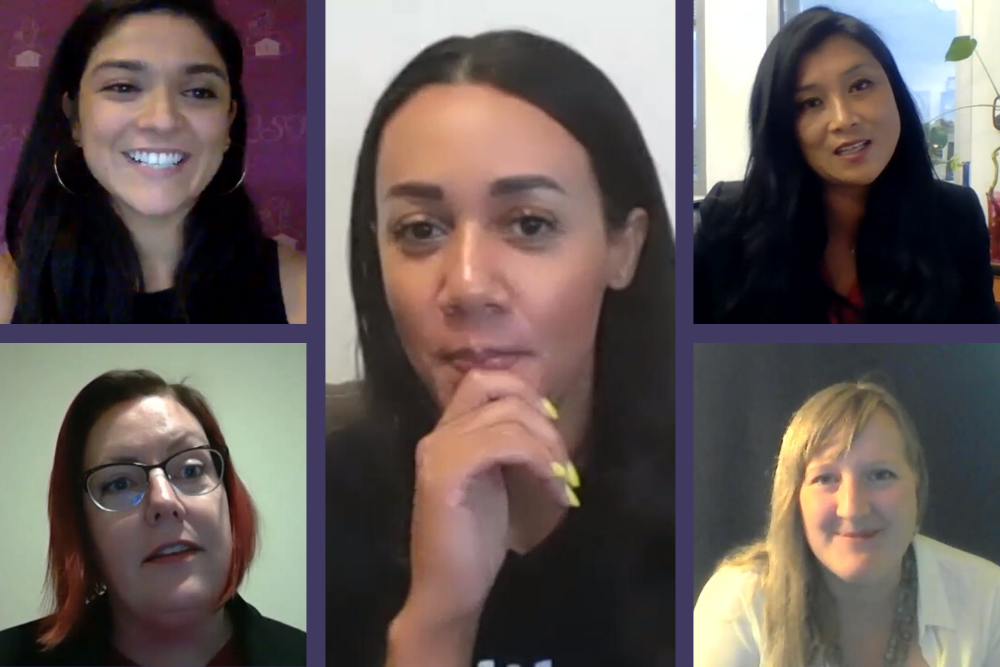
Experts Weigh In: Domestic Violence Awareness Month
Chat4Change Focuses on Domestic Violence Awareness Month
It’s Domestic Violence Awareness Month, but things have changed in 2020. The COVID-19 pandemic has intensified the impact on domestic violence survivors. While closures and stay at home orders were meant to protect public health, they also exposed inequities and created multiple new stresses, including health risks, isolation, the closure of many schools and businesses, increased economic vulnerability and job losses.
On October 22, more than 60 people joined our latest Chat4Change, focusing on the resounding impacts of domestic violence. Experts from across the state participated in a virtual panel discussion led by WFCO Trustee Danielle Shoots.
Chat4Change: The Resounding Impacts of Domestic Violence 10.22.2020 from Women’s Foundation of Colorado on Vimeo.
An increase in domestic violence: What the experts are seeing across Colorado
In 2019, nearly 25,000 individuals were served by the Domestic Violence Program, founded by the Colorado Department of Human Services in the Office of Children, Youth, and Families. This year, due to the pandemic, these numbers have increased, putting a huge strain on organizations, programs and services supporting survivors.
Latina SafeHouse, an organization dedicated to helping Latina survivors of domestic violence and their families, saw a “780% rise in domestic violence survivor intakes, as well as increases in requests for financial and housing assistance,” according to Angela Ceseña, executive director. “We’ve had to shift to meet survivors where they are, providing more survivor-driven direct services and assistance with basic needs like housing and food.”
Ashlee Lewis, executive director of The Initiative, an organization that supports and advocates for people with disabilities who have experienced abuse, said her organization is experiencing increases as well, seeing a 30% increase in crisis calls and requests for housing. “Our staff has shifted into providing direct services,” said Ashlee. “Our biggest need is housing. Over the past four months we’ve helped more than 40 families.”
While Advocates of Lake County, a rural victim advocacy organization, initially saw a decrease in calls, Jenny Abbott, executive director expects to see an overall 10-20% increase in domestic violence cases. “I think the initial dramatic drop was due to cases not being reported,” she said. “With everything closed like schools and workplaces, people were isolated and many of our channels for reporting domestic violence cases were unavailable. What we did see however, was an increase in severity of cases.”
Domestic Violence Awareness Month brings to light the different forms of abuse
While the most visible aspect of domestic violence is physical, abuse takes on different forms, and often includes behaviors and outcomes that are unseen and unheard. This includes economic abuse, digital abuse, sexual abuse, emotional abuse, threats of deportation and homelessness, withholding care, and other forms of control.
“Our data in Colorado shows that financial insecurity is the number one barrier to survivor security,” explained Amy Miller, executive director, Violence Free Colorado, a state domestic violence coalition. “The pandemic has created the perfect storm, exacerbating already existing issues such as changes in income and increased vulnerability that create situations of power and control over domestic violence survivors.”
Ashlee Lewis agreed: “Physical abuse is just one of the tactics we see,” she said. “Many people with disabilities are dependent on government assistance and caretakers who control the purse strings and resources. The threat of not having their basic needs of food and shelter met, combined with the stigma of disability, often prevents survivors from moving out of abusive situations.”
According to Angela Ceseña, the same holds true for the Latinx community. “Domestic violence doesn’t happen in a vacuum. The challenges of economic security, language barriers, immigration policies, affordable housing and more are wound up in systemic racism and marginalization and are control tactics that can be held against survivors,” she said.
“Especially for undocumented survivors, this creates an environment where they are afraid to speak up. They have nowhere to go, they don’t qualify for government assistance and there’s no path to financial independence. It’s a leading cause of homelessness for Latinx survivors.”
A solutions-based approach needed
Since 2016, Violence Free Colorado advocates for affordable housing, and for a percentage of that funding to specifically support survivors of domestic violence. The organization also helped encourage the ability for survivors to break leases early and prohibit landlords from evicting people under the Emergency Nuisance Law, due to multiple emergency calls.
“Paid family medical leave and increase in the minimum wage can also go a long way to provide economic security and a way to safety for survivors, but other policy changes are necessary too” said Amy Miller. “We need more money for affordable housing, child care support so that survivors can work, and a road to rapid rehousing for families vs. the emergency shelter approach. At the end of the day, we need to shift our resources and come up with alternative interventions and long-term solutions to put an end to domestic violence.”
Domestic Violence Awareness resources
National Domestic Violence Hotline
Domestic violence resources throughout Colorado
Colorado Office of Children, Youth, and Families: Domestic Violence Program
Domestic violence services map
Free community awareness education to ensure that community agencies serving survivors with disabilities are aware of the unique needs of marginalized communities and of their accessibility concerns
Intersectionality in domestic violence awareness
Safe and confidential voting options in Colorado
Survivors Know Best: How to Interrupt Intimate Partner Violence During COVID-19 and Beyond
Rose Andom Center: After hours and shelter resources

